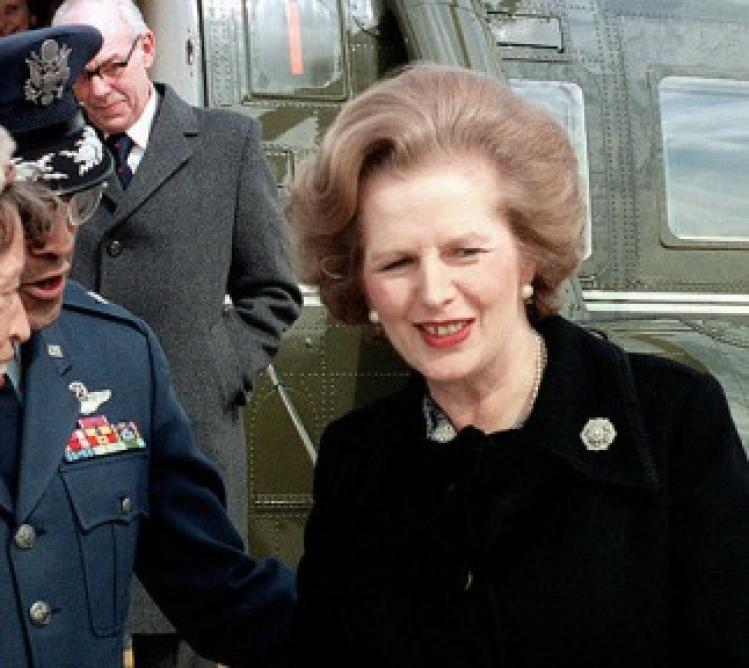
Two important conservatives departed this life within days of each other. One was a world-historical figure with extravagant political gifts, and she rarely harbored any doubts about the way forward. The other’s misgivings about politics led him to counsel Christians to undertake a political “fast” and “flock to soup kitchens, battered women’s shelters, prison cells and hospitals.”
Margaret Thatcher, who died on Monday, changed Britain and altered the trajectory of global politics. David Kuo, who passed away last Friday, received well-earned attention for his work in and out of politics on behalf of the poor. But he would almost certainly laugh, dismissively if merrily, at the idea of a former White House aide being linked with someone so central to the narrative of our era.
Yet because Thatcher, 87, and Kuo, 44, represented two sides of the conservative disposition and two forms of the “conviction politics” for which the Iron Lady was known, both have much to teach us about the debate we need now.
Thatcher’s was the stern conservatism of the marketplace. She valued the virtues of thrift and enterprise, evangelizing not about religion but about an economic system. She loved capitalism for its “vivacity” and “verve,” for “the energy, the vigor, the dynamism” it promoted, and she set her face against collectivism and socialism.
Kuo was no less committed to capitalism in principle. But his faith was religious. He was one of the original “compassionate conservatives,” and he remained one to his dying day. As his friend Joe Klein of Time magazine put it: “He was a man of faith, rather than of religion. He called himself a Follower of Jesus. Many of his friends had ministries, but David’s church truly had no walls.”
Kuo’s passions were engaged less by honoring the contributions of the successful than by demanding attention to the suffering of those left out of the grand capitalist party -- among them the 35 million Americans “at risk of hunger every day,” and the million people “released from prison every year with virtually no one to help them productively re-enter society.”
Thatcher’s fans loved her for the enemies she made among trade unionists, leftist intellectuals, and members of her own Conservative Party (“the wets” as they were labeled) prepared to compromise with the forces of socialism.
Kuo ruffled feelings after he left the White House when he sharply criticized the workings of former President Bush’s faith-based initiative. This disillusionment led to his suggestion of a Christian political fast in his 2006 book, Tempting Faith.
But Kuo was allergic to the idea of enmity and spent much of his time pleading with the left and the right to learn from each other. He wanted liberals to understand the power of religious faith “as a catalyst for radical change in people’s lives” and the importance of non-governmental charitable organizations. He urged conservatives to admit that “governmental programs can do -- and have done -- good,” citing as evidence food stamps, Social Security, and Medicare.
Let me be upfront about my own engagement here. I knew Kuo for 17 years and encouraged him in 1997 to write his “Poverty 101” piece urging trans-ideological learning. And while I respected Thatcher’s strength of character (it’s hard not to) and how she personally broke through Britain’s class and gender barriers, I am not an unabashed admirer.
Thatcher made Britain governable again, no small achievement, but her policies left behind a large economic divide between its regions and its classes. The deregulation she championed (kept intact by subsequent Labor Party governments) fostered havoc in the financial sector in 2008.
But the well-known Thatcher statement that ought to call forth the most dissent was this declaration: “There is no such thing as society.” Instead, she insisted: “There are individual men and women, and there are families.”
Prime Minister David Cameron has spoken glowingly of Thatcher. But in defining a post-Thatcher vision after he was elected Conservative Party leader in 2005, he pointedly backed away from her view. “There is such a thing as society,” Cameron said. “It’s just not the same thing as the state.”
This is exactly what Kuo was getting at when he urged cooperation between government and the institutions of civil society in alleviating poverty. You do not have to be a socialist to believe in the social, and you do not have to reject liberty to believe in community. Thatcher and Kuo will never have a chance to argue about that, in this world at least. But we should.
(c) 2013, Washington Post Writers Group

